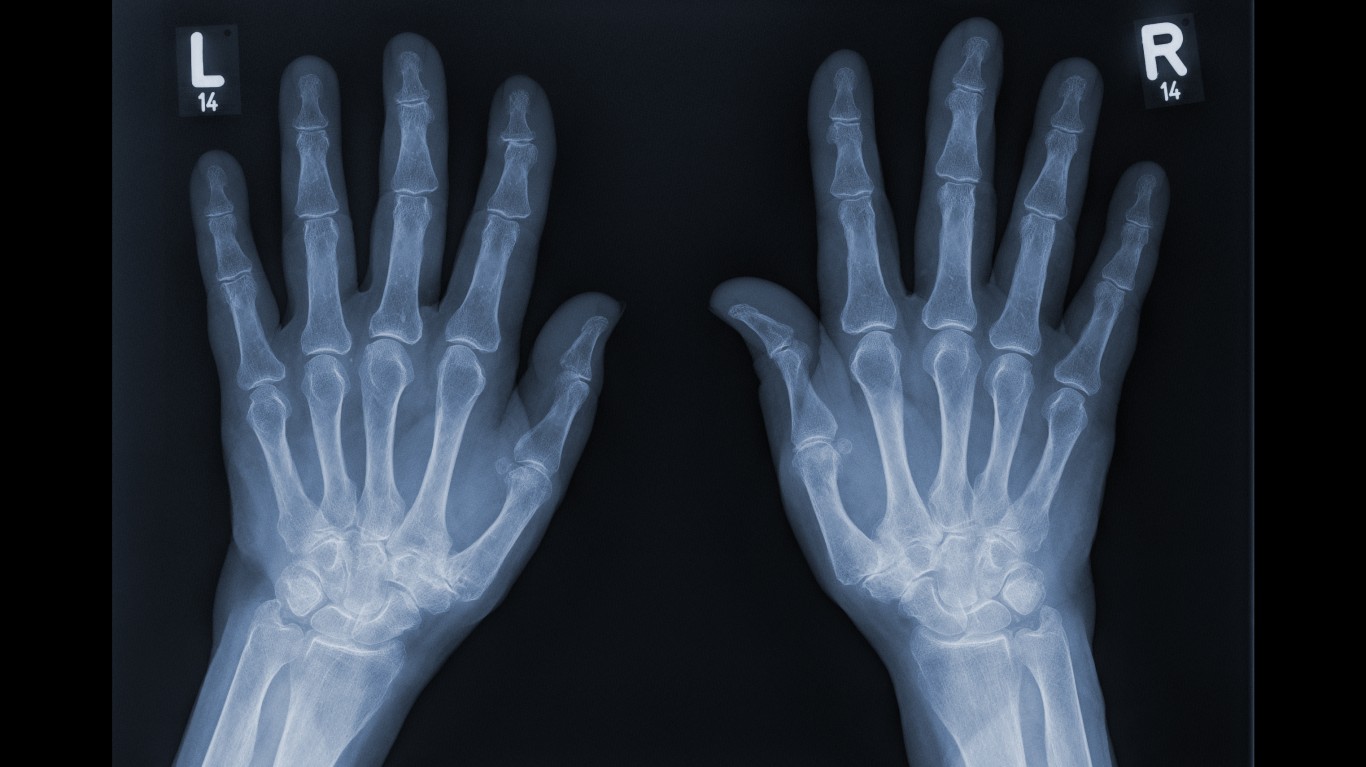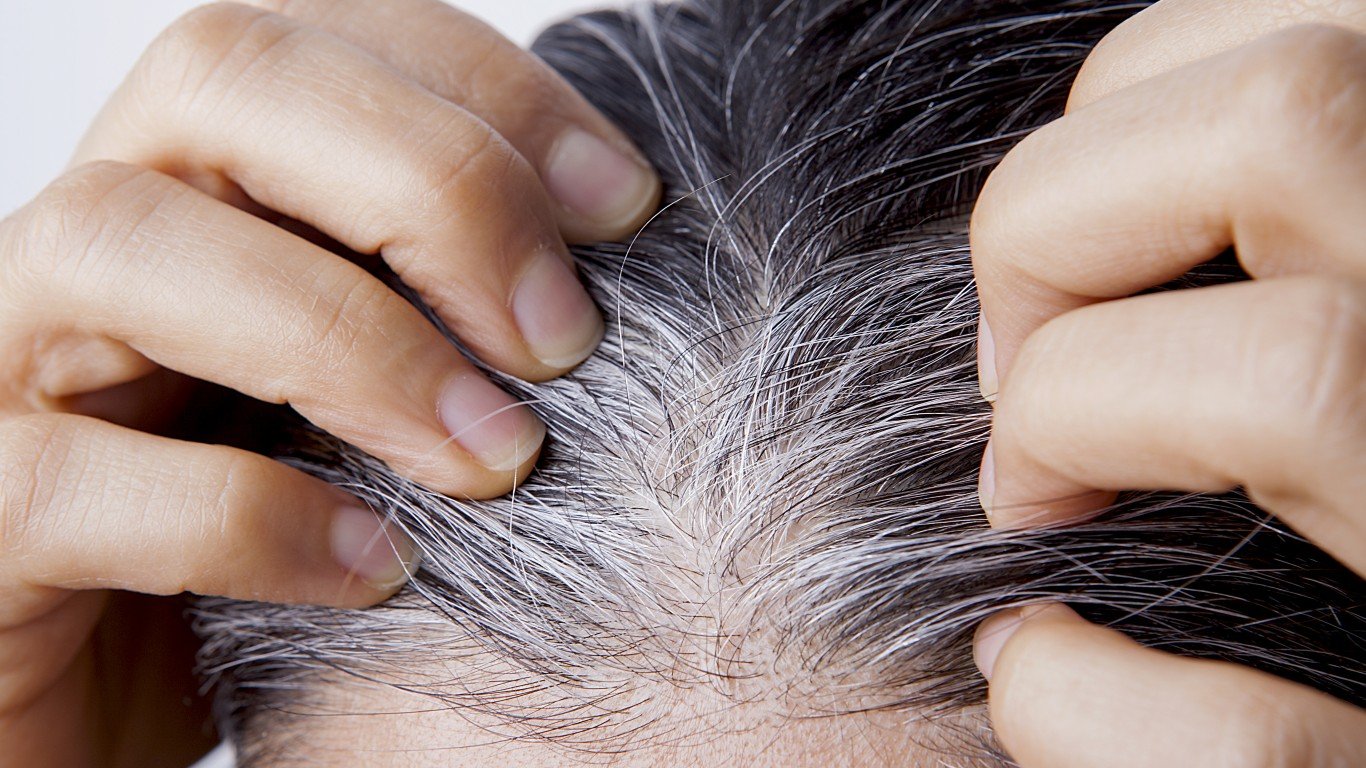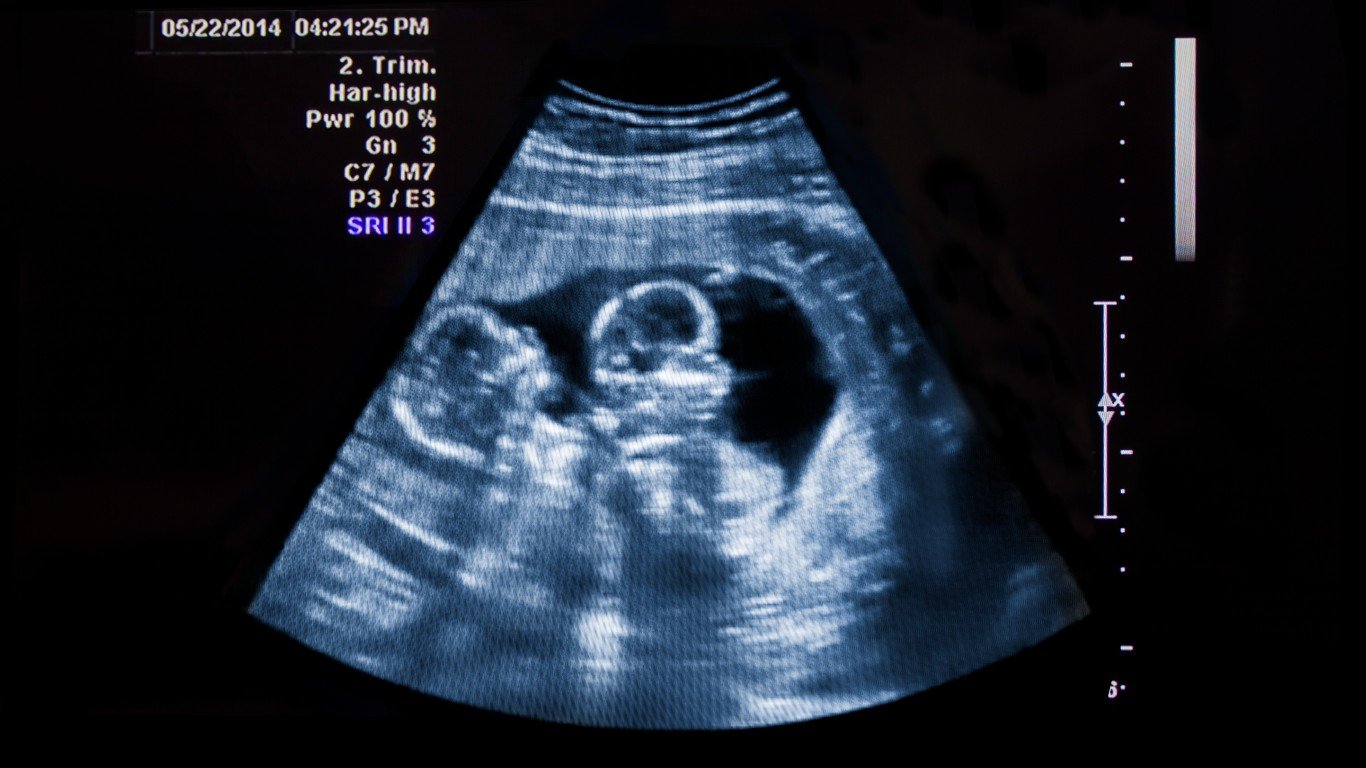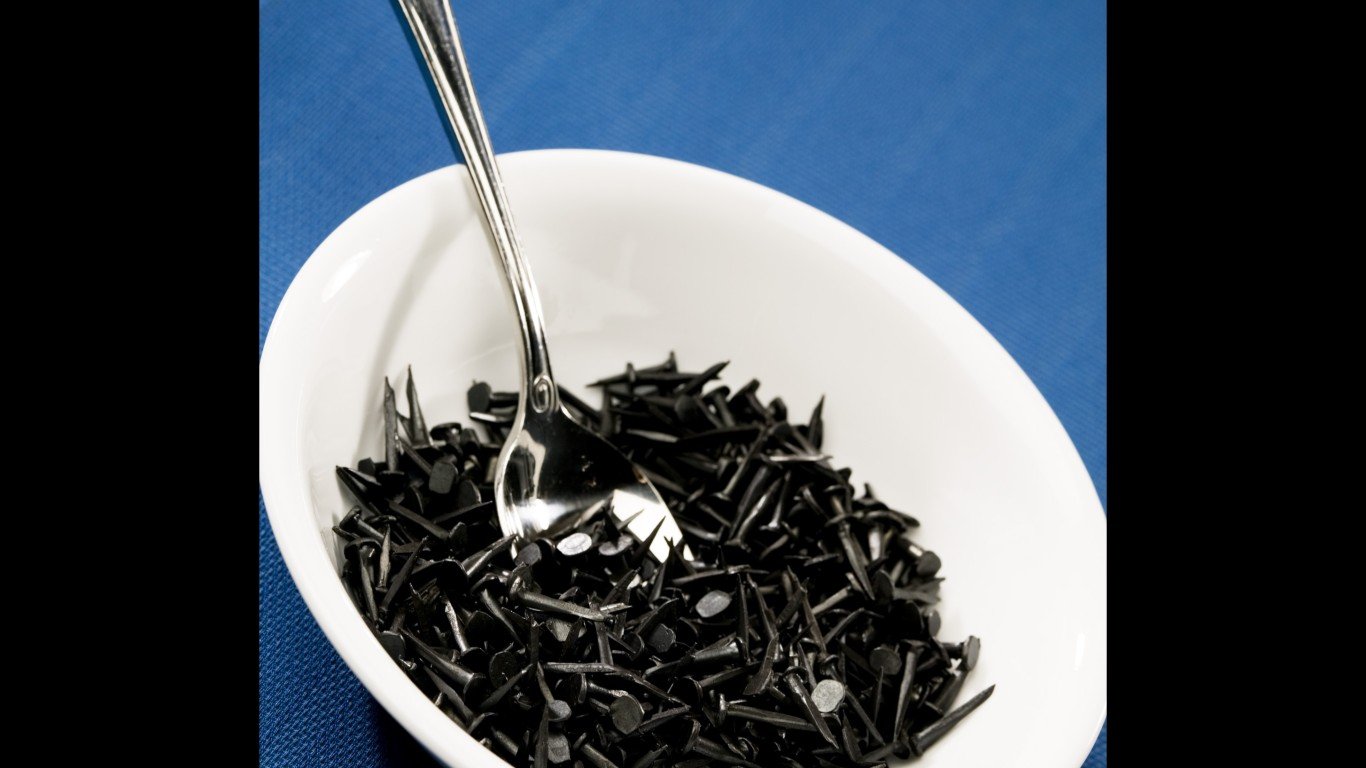

The human body is pretty tough most of the time. It overcomes widespread illnesses, such as the flu, and adapts to common chronic conditions, such as diabetes, to function optimally. But there are also diseases and conditions so rare and bizarre that they afflict the body in ways most doctors have only read about in medical literature – diseases and conditions most people don’t even know exist.
To find rare and mysterious medical conditions, 24/7 Tempo reviewed several news and medical sites. A medical condition is defined as rare, according to the Food and Drug Administration, when it affects fewer than 200,000 people in the U.S. All of the diseases on the list are rare by that standard, and some are extremely uncommon. (In contrast, these are the most common ailments in America.)
Click here to see 27 rare and mysterious medical conditions
Among our discoveries: There is a speech disorder that causes people to suddenly start speaking in a foreign accent. Another condition – which may sound like something desirable but that can be very dangerous – prevents people from feeling any physical pain. There is even an illness that makes people believe that they’re dead.
Some of these rare conditions are merely inconvenient or embarrassing, but others can be deadly. (These are the most dangerous diseases you can get on earth.)

1. Alice in Wonderland Syndrome (Todd’s Syndrome)
Alice in Wonderland Syndrome, also known as Todd’s Syndrome, is a condition that affects vision, touch, and hearing, causing temporary episodes of distorted perception. Patients may feel larger or smaller than they actually are. They may also feel that objects around them, such as furniture, are moving away or closer to them. The condition affects mostly children and young adults, who often outgrow it. Though it may affect between 10% and 20% of the world’s population, episodes of disorientation occur infrequently.
[in-text-ad]

2. Alien Hand Syndrome
Alien Hand Syndrome is a very rare condition in which a person has no control over one of his or her hands. The hand in question can still move but the movements are involuntary and are often unnecessary or inappropriate, such as slapping. The condition can last from several days to several years and there is no cure.
3. Alkaptonuria (Black Urine Disease)
Alkaptonuria is a very rare inherited disorder. It prevents the body from breaking down certain amino acids, resulting in a buildup of a chemical called homogentisic acid in the skin and other body tissues. People with the condition may have dark urine which turns black when left when exposed to air. There is no treatment for Alkaptonuria but symptoms can be managed with a low-protein diet and with medication to relieve the joint pain that often accompanies the affliction.

4. Aquagenic Urticaria (Water Allergy)
Water Allergy is an extremely rare condition, first recorded in 1964. Since then there have been about 50 cases observed around the world. The condition, for which a cause is not yet known, causes the skin to develop hives after coming in contact with water of any temperature.
[in-text-ad-2]

5. Auto-Brewery Syndrome (Gut Fermentation Syndrome)
Gut Fermentation Syndrome or Auto-Brewery Syndrome is known to most people as the drunkenness disease because, somehow, the body makes ethanol (grain alcohol) in the gastrointestinal system from carbs, resulting in people getting drunk without actually drinking alcohol. Only a few cases have been documented in several decades.

6. Canities subita (Marie Antoinette Syndrome)
Canities subita is the sudden, seemingly overnight onset of white or gray hair due to stress or some kind of trauma. The most famous such case is that of Queen Marie Antoinette of France, whose hair allegedly whitened shortly before her guillotining in 1793. Some doctors think this autoimmune disorder is connected to melanin, a substance that produces hair and skin pigmentation.
[in-text-ad]

7. Congenital insensitivity to pain
Congenital insensitivity to pain is a condition that makes a person unable to feel any physical pain. People who have CIP are born with it. Since pain is the body’s way of telling people to be careful, those who don’t feel it are at higher risk of serious injuries. For example, they can put their hands into boiling water and not feel anything while their skin is burning. Fewer than 1,000 people in the U.S. are affected by the condition and the odds of a baby being born with it are 1 in 125 million.

8. Cotard’s Syndrome (Walking Corpse Syndrome)
Cotard’s Syndrome is a mental disorder in which the person affected by it believes he or she has lost organs, body parts, or is dead. Patients with the condition usually suffer from a mood disorder, a psychotic disorder, or other medical condition. A search of the Mayo Clinic database for the 1996-2016 period revealed 12 cases.
9. Epidermodysplasia verruciformis (EV; Tree Man Syndrome)
Tree Man Syndrome is a genetic skin disease characterized by a decreased ability to protect against some types of human papillomavirus (HPV), resulting in chronic infections and lesions. The genetic condition, which is rare, may lead to cancer developing in parts of the body that are often exposed to sun.
[in-text-ad-2]
10. Exploding Head Syndrome
Exploding Head Syndrome is a sleeping disorder. People affected by it hear loud “exploding” noise (that isn’t real or heard by anyone else) as they transition from wakefulness to deep sleep. The condition, for which the number of cases is not yet known, is not dangerous but people with it often experience fatigue during the day. Though there is no treatment for this type of parasomnia, certain medications may alleviate the symptoms.

11. Familial Cold Autoinflammatory Syndrome (FCAS) – cold allergy
FCAS is a rare, inherited disorder that affects how the body controls inflammation. It is characterized by episodes of rash, fever, and joint pain when the body is exposed to cold temperatures usually for an hour or longer.
[in-text-ad]

12. Fatal Familial Insomnia
Fatal Familial Insomnia is a very rare degenerative brain disorder characterized by insomnia that gets worse with time, eventually resulting in physical and mental deterioration, followed by coma and death. It is estimated that only about 100 people in the world have the gene that causes the condition.

13. Foreign Accent Syndrome
Foreign Accent Syndrome is a rare speech disorder. Affected people start to speak with a different accent, usually that of another country, sometimes to the point that their native language sounds as if it were actually their second or even third language. The condition is most common after a head injury, stroke, or other damage to the central nervous system. Some versions of Foreign Accent Syndrome have a psychological trigger. There were only about 100 cases reported between 1907 and 2014.
14. Hutchinson-Gilford Progeria Syndrome
Progeria is a rare genetic disease that causes children to age rapidly after 24 months. Some of the symptoms include slow growth, disproportionately small face, large head, short stature, and low weight. The condition is caused by mutation in the gene that makes the protein in the body responsible for shaping the nucleus within cells. Children with progeria live about 15 years and usually die from complications of heart disease. Currently, there are about 400 children around the world with the condition.
[in-text-ad-2]

15. Hyperthymesia
Hyperthymesia is also known as Highly Superior Autobiographical Memory (HSAM). Few people in the world have the condition, which basically means they can remember just about every day of their lives in great detail. There have been suggestions that HSAM, the cause for which is still unknown, is linked to autism and obsessive-compulsive disorder but there has been no definitive link to prove a connection.

16. Hypertrichosis (Human Werewolf Syndrome)
Hypertrichosis is an extremely rare condition that tends to run in families. It is defined as excessive hair growth anywhere on the body in men or women and can develop at any point in life. Scientists think that for people born with hypertrichosis, the inactive genes that caused excessive hair in humans living millions of years ago get reactivated in the womb for an unknown reason. Hypertrichosis that develops later in life may be due to malnutrition, poor diet, cell mutation, or certain skin diseases.
[in-text-ad]

17. Methemoglobinemia (Blue Skin Disorder)
Methemoglobinemia, or MetHb, is a very rare blood disorder in which little oxygen is delivered to cells throughout the body. In those who have it, red blood cells contain methemoglobin, a form of hemoglobin that can’t carry oxygen, at levels higher than 1%. People are either born with it or can develop it later in life after exposure to certain drugs or chemicals. Most people with the condition have no symptoms in which case treatment may not be required. Severe cases may need blood transfusion.

18. Mirror-Touch Synesthesia
Mirror-Touch Synesthesia (MTS) is a rare neurological condition in which a person feels sensations when seeing someone else being touched – similar sensations in the same or opposite part of the body. This usually means that a person feels pain when he or she sees someone else getting hurt. What causes MTS, which affects between 2% and 4% of people, is unclear.
19. Moebius Syndrome
Moebius Syndrome is a very rare birth defect – a neurological disorder characterized by the absence or underdevelopment of the nerves that control eye movements and facial expression. What causes the paralysis, which may affect as many as one in 50,000 people, is unclear but some research suggests it may be linked to genetic and environmental factors. People affected by the condition are usually unable to smile, raise their eyebrows, or even close their eyelids.
[in-text-ad-2]
20. Munchmeyer’s Disease (Stone Man Syndrome)
Munchmeyer’s Disease is a very rare genetic condition characterized by congenital malformations of the toes. Sporadic and painful flare ups eventually cause muscles, tendons, and ligaments to turn to bone. By the time a patient has reached early adulthood, he or she is completely immobilized. People with the disease live to about 55 years old, though most of their lives are spent in a wheelchair.

21. Parasitic twin
A parasitic twin is also called an asymmetrical twin or unequal conjoined twin. The twin has stopped developing during the gestation period of a pregnancy but remains physically attached to the developing twin. The fully developed twin is later born with limbs or other organs still attached and a surgery is needed to remove it. What triggers the deformity is unclear and there are no symptoms. There have been fewer than 200 cases of a parasitic twin ever reported.
[in-text-ad]

22. Pica
Pica is a mental health condition and eating disorder characterized by compulsively eating and swallowing non-food items, such as ice, hair, chalk, or soap. The most common causes of Pica, which is thought of as the body’s way to correct a nutrient deficiency, are anemia and malnutrition. Pica is not considered dangerous, though that depends on what item a person is trying to swallow.
23. Proteus Syndrome
Proteus Syndrome is a very rare genetic condition characterized by an excessive growth of bones, skin, organs or other parts of the body. Though any part of the body can be affected, the most common ones are bones in the limbs, skull, and spine. Proteus syndrome, which is not inherited and can arise randomly during prenatal development stages, is extremely rare with only a few hundred cases ever reported and an incidence of less than one in a million.

24. Rapunzel Syndrome
Rapunzel Syndrome is not a hair problem per se; it is a very rare intestinal condition – usually among girls and young women – that results when a person ingests hair, which gets stuck in the stomach. The condition often goes undetected for years as there are no symptoms for a long time. By the time symptoms – usually bloating, nausea, feeling full, and vomiting – are observed, the hair ball is large and surgery is needed to remove it.
[in-text-ad-2]
25. Trimethylaminuria (Fish Odor Syndrome)
As the nickname for this very rare metabolic disorder may suggest, it is a condition that causes a person’s sweat, breath, and urine to smell like fish. There is no cure for it but the unpleasant fishy odor can be controlled with changes in diet and the use of certain soaps and lotions. Though some people with the condition, which is more common among women, inherit the defective genes that cause it, others develop it after taking certain medications.

26. Xeroderma pigmentosum (Vampire Syndrome)
Xeroderma pigmentosum, often just called XP, is an inherited condition characterized by an extreme sensitivity to sunlight. The body usually repairs damage to the skin caused by the sun’s harmful ultraviolet light. However, people with XP lack this ability, leaving them at greatly increased risk of developing skin cancer. Vampire Syndrome is rare because it copies the abnormal gene that causes the condition and must be inherited from both parents.
Take This Retirement Quiz To Get Matched With A Financial Advisor (Sponsored)
Take the quiz below to get matched with a financial advisor today.
Each advisor has been vetted by SmartAsset and is held to a fiduciary standard to act in your best interests.
Here’s how it works:
1. Answer SmartAsset advisor match quiz
2. Review your pre-screened matches at your leisure. Check out the
advisors’ profiles.
3. Speak with advisors at no cost to you. Have an introductory call on the phone or introduction in person and choose whom to work with in the future
Take the retirement quiz right here.
Thank you for reading! Have some feedback for us?
Contact the 24/7 Wall St. editorial team.
 24/7 Wall St.
24/7 Wall St. 24/7 Wall St.
24/7 Wall St. 24/7 Wall St.
24/7 Wall St.



